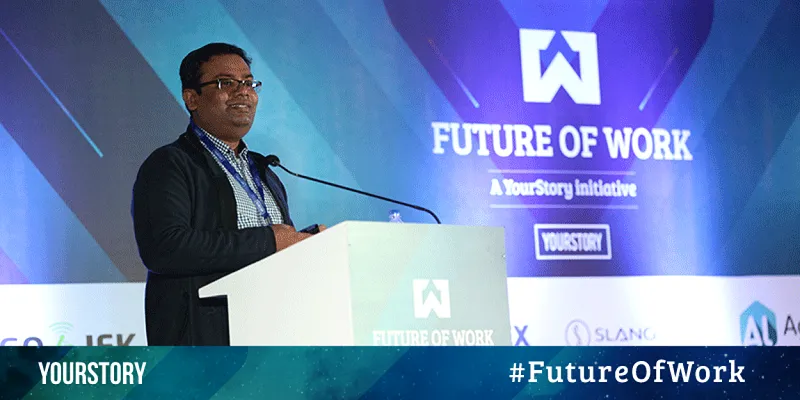Build it right, not fast: how Pravin Jadhav built Paytm Money with a team of 6

Pravin Jadhav has seen, up close and personal, how the fin-tech and fin-serv ecosystem in India has evolved over the years. An entrepreneur for three years, his most prominent stints later include being head of growth at fintech startup FreeCharge, and that of a consultant at One97 Communications, which owns fintech unicorn Paytm.
Today, he is known as the man who built Paytm's investment and wealth management business - Paytm Money. As the Director of the smallest company of the Paytm group (which includes Paytm payments bank and ecommerce arm Paytm Mall), he is known to build products and scale them up from zero. Naturally, his talk on ‘Building from scratch, building for scale’ at the second edition of YourStory’s Future of Work conference at Whitefield, Bengaluru, attracted a big crowd of entrepreneurs and techies hoping to gain some wisdom.
And Pravin did not disappoint. He recounted the journey of Paytm Money, from Day 1, when it was just him in the office. Although the company was launched in January 2018, it took 45 days to get six people in the team. “Only one of them was an engineer, and he specialised in Windows, which was not really our core. We didn’t know how to code, so we were waiting for engineers, and would watch Youtube videos in office to pass time,” he recollects with a laugh.
Need for better customer experience
The team did its research though. The team members started off with going through about 50,000 reviews of the top 30 investment apps. Pravin noticed that while one of the largest online platforms was easy to use, provided a good view of the portfolio and good technical support, it also had issues in loading and there were frequent cases of app crash. Besides, customer support was poor, and the app faced device compatibility issues. There were also problems like incorrect data and lack of direct funds.
Another top-funded startup in that space with 100,000 downloads was easy to use and provided good content about finance, but did not provide eKYC Aadhaar facility, and was provided incorrect mutual fund investment values. There were also basic problems like the app showing no internet connection even when it is connected. Often, it had to be uninstalled and reinstalled. Pravin claims another app charged high brokerage fee while providing poor customer support.
“We figured that we won’t invest via such apps; why should our users? So we wanted to provide great customer experience. But first, we had to show why invest in mutual funds than put money in banks. (In India only 17 million people have invested in mutual funds),” he says.
Slow and steady
Although they did the research and listened to the industry closely, Pravin and his team decided to build their product in a different way. “We did what we thought was right. For example, we did not integrate third-party service providers. Because products that were already available used the same platforms to give the same experience to the customer. Also, design is not just how it looks, design is how it works. Just a couple of engineers in our team built the backend of our product and we were happy about the decision,” he says.
Pravin believes that the decision that makes or breaks up your startup is what you choose: build it fast (in, say, three months) or build it right (in six to nine months). “For instance, two minutes is all it takes for onboarding 36 asset management companies (AMCs) but instead, we individually did it to tell them the kind of experience we give. It took us a minimum of four (and maximum 17) months too close an agreement with one AMC.”
Long journey for Paytm Money
Building your own tech platform is a long journey. It includes onboarding AMCs, building a KYC system, designing data and discovery, establishing payments and transaction processing, and handling operations and customer relationship management. Paytm Money’s team grew into a team of 100 by September 2018.
“At the launch of the app, we were expecting some 200 KYC requests in a day; but we got more than 2000 in the first few hours itself. In fact, the app crashed and we got negative reviews because of that,” Pravin reminisces.
Paytm Money claims to have the highest folios and SIP registrations in the first month of launch, and more than 1.5 million registered users to date. Pravin says that more than 55 percent of these are first time users, and have initiated KYC for mutual funds for the first time in their life.
Also read: The Product Management map for entrepreneurs: how to create great products that delight customers
Today, Paytm Money is a team of 250. Pravin proudly says that the company has not spent aa rupee for customer acquisition. Transactions are processed in real time, and the team is building the capability to do one million transactions a day. Paytm Money also claims to be the lightest app in the sector, with 7.2 MB on Android; the next best was 14MB. Today, they get about 10,000 KYC requests daily, and 80 percent are processed in 30 minutes. It claims 99.98 percent transaction success rate.
From his experience, Pravin’s advice to anyone looking to scale is, “If you are building early, build it right.”
A big shout out to Future of Work 2019 sponsors – Deployment partner Harness.io, Super partner GO-JEK, our Women-in-Tech partner ThoughtWorks, Voice Tech partner Slang Labs, Technology partner Techl33t, AI/ML partner Agara Labs, API Partner Postman and Blockchain partner Koinex.








